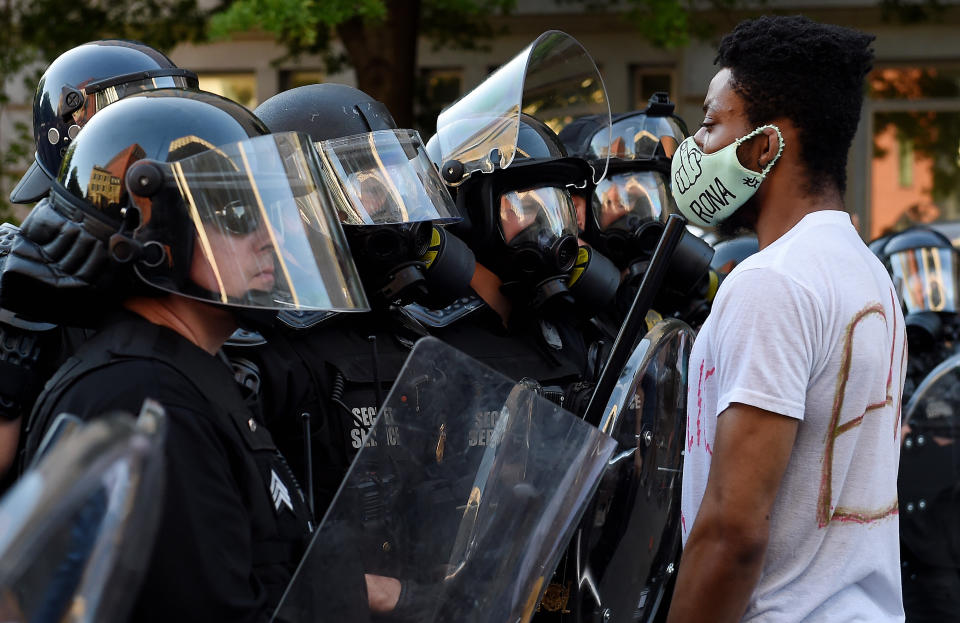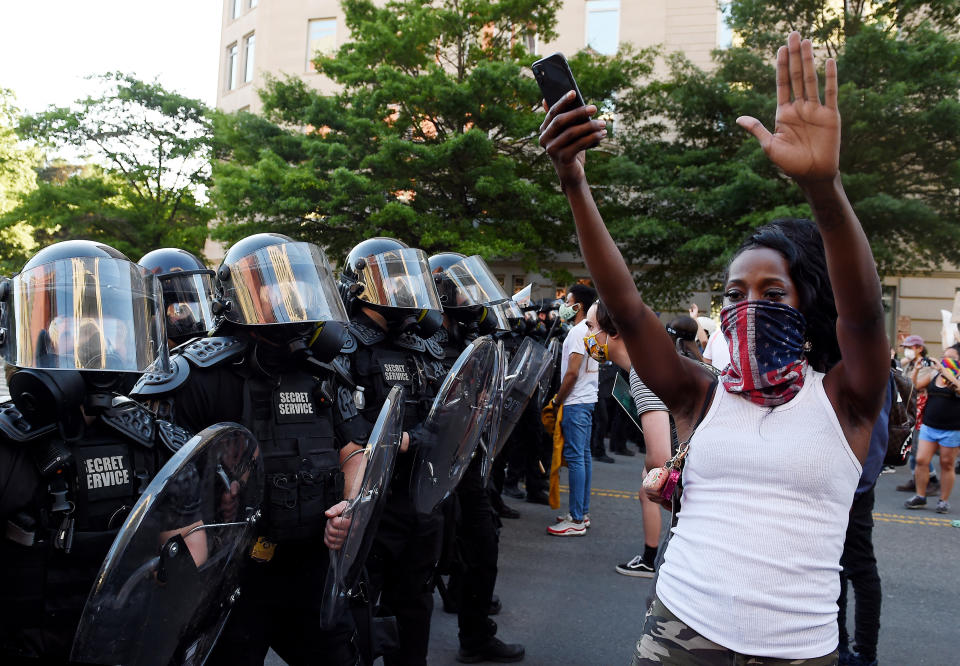States Have Put 54 New Restrictions On Peaceful Protests Since Ferguson

The historic wave of protests sparked by the death of George Floyd has spurred a new debate over the legitimacy of political violence as some demonstrators have turned to vandalism, looting and setting fires in defiance of police brutality and racism.
But as last Friday’s demonstrations kicked off in Minneapolis ― where Floyd, a Black man, was killed by police officers ― Louisiana lawmakers some 2,500 miles south voted overwhelmingly to pass harsh new legislation cracking down on peaceful protests. The bill set a three-year mandatory minimum prison sentence with hard labor for protesters convicted of trespassing on fossil fuel and other infrastructure sites during a state of emergency like the one declared amid the coronavirus pandemic.
The legislation had actually been months in the making, and it’s hardly a one-off. Since 2015 ― in the wake of protests set off by the police killing of Michael Brown in Ferguson, Missouri ― states have introduced at least 154 bills or executive orders to restrict peaceful protest, according to a HuffPost analysis of the International Center for Not-For-Profit Law’s tally, a new report from PEN America, and interviews with free speech experts. So far, 54 have become law. More than two dozen ― including the Louisiana measure, which is awaiting the governor’s signature ― are pending.
These new restrictions on peaceful protest are not directly linked to an uptick in less-peaceful tactics over the past week. In fact, many of the current protesters have condemned actions like brick-throwing and looting, blaming the worst offenses on agitators who don’t share their anti-racist goals.
But a number of the largest U.S. cities where nightly protests are taking place have put curfews in place, including New York City, Washington, D.C., and Minneapolis. Researchers warn that the proliferation of new restrictions could push future protesters to embrace more combative tactics as the legal risks of peaceful gatherings rise.
“There’s a multiplier effect,” said Dana Fisher, a sociologist who studies protest movements at the University of Maryland, College Park. “If people don’t think they’re allowed to peacefully protest, they’re going to be prepared for more confrontational protest.”
Pipeline Protections
Of the 22 anti-protest laws passed over the last four years, 12 designated fossil fuel sites as “critical infrastructure” and ramped up penalties for trespassing or tampering with the equipment there. The statutes, promoted in state legislatures by the right-wing American Legislative Exchange Council following the 2016 Dakota Access Pipeline protests, typically elevated low-level misdemeanor charges to felonies with thousands of dollars in fines and prison time.
Louisiana adopted such a statute in 2018. Last week, lawmakers expanded on the measure, adding the mandatory minimum sentencing provision that could send peaceful protesters to prison for standing near any of Louisiana’s 125,000 miles of pipeline, much of which is buried and therefore difficult to avoid when planning demonstrations.

While the Louisiana bill proposes some of the most inflexible penalties, more than half a dozen other states enacted similar legislation in just the past two years. Three states ― Kentucky, South Dakota and West Virginia ― passed new laws restricting fossil fuel protests in March, as the country went into lockdown over the pandemic. Alabama lawmakers advanced their bill in May, but failed to pass it before the legislative session ended.
So-called “critical infrastructure” bills have passed more easily than other protest restrictions because big companies, particularly oil giants, have deployed their expansive lobbying networks to back the measures.
New Penalties And Definitions For Riots
More than a dozen states have proposed new bills to discourage riots, though the legislation was most successful in the Dakotas, where heated pipeline protests are recent events that seem likely to repeat.
In 2017, North Dakota increased the charges for participating in a riot. It was previously a Class A misdemeanor, which was punishable by up to a year in prison and a $3,000 fine. Under the newer law, joining a riot with more than 100 people is a Class B felony, subject to 10 years in prison and $20,000 in fines.
South Dakota has become a hotbed for anti-protest legislation, particularly since Gov. Kristi Noem (R) took office last year. Over the course of three days in March 2019, the state legislature passed a law criminalizing “riot boosting,” setting forth harsh penalties for those who encourage acts of “force or violence” but do not take part themselves. The American Civil Liberties Union sued to block the law, and state officials dialed back the measure as part of a settlement.
When you have mass movements and a lot of people in the street, you see false arrests and heavy-duty charge stacking to get people to plead to lesser charges. ... These laws are a gift to that type of prosecution. Mara Verheyden-Hilliard, executive director of the Partnership for Civil Justice Fund
Then this March, South Dakota enacted new measures expanding the definition of a felony “riot” to “intentional use of force or violence by three or more persons” that causes “any damage to property.” The law covers those who “urge” a riot, which it defines as “instigating, inciting, or directing” but excluding “oral or written advocacy of ideas or expression of belief that does not urge ... imminent force or violence.”
It took less than a month in early 2018 for West Virginia to enact a law extending protections for police officers to the state’s Capitol Police when they kill or wound anyone present, “spectator or otherwise,” while dispersing a riot.
Mara Verheyden-Hilliard, executive director of the nonprofit Partnership for Civil Justice Fund, said the statute was known among lawyers and advocates as the “shoot-a-teacher law” because it was passed amid the West Virginia’s teachers strike.
Protesters Can’t Block Traffic, But Drivers Can Hit Them
Seven states proposed, but ultimately failed to pass, legislation limiting liability for drivers who hit or run over protesters who are blocking streets. In addition to protecting drivers, those bills and more than a dozen other proposed laws sought to increase penalties for protesters who block traffic or gather without approval on private or public land. The latter measures became law in two states.
A 2017 South Dakota law enabled the governor and sheriffs to ban gatherings of more than 20 people on public land if the gathering could damage the land or the renters’ use of that property. It also gave the state Department of Transportation the right to bar protests that interfere with highway traffic, increasing the penalties for obstructing roadways to one year behind bars and a $2,000 fine.
That same year, Tennessee imposed new $200 fines ― plus up to 30 days in jail ― for anyone who obstructs an emergency vehicle, which it broadly defined as “any vehicle of a governmental department or public service corporation when responding to an emergency.”
Curbing Free Speech, Especially About Israel
Proposed laws to punish students or universities for protests that block controversial speakers from appearing on campus are pending in six states and were defeated in another 11.
In 2018, Missouri banned public employees from picketing, though a federal judge blocked the law from being enforced in January 2020.
A Utah law enacted three months ago expanded “disorderly conduct” in the legislature or at meetings of government officials to include creating annoyance or alarm with “unreasonable noise.” The restrictions could apply to a silent protester who “refuses to comply with the lawful order of a law enforcement officer to move from a public place or an official meeting, or knowingly creates a hazardous or physically offensive condition.” The measure mandated a $750 fine for first offenses, up to three months in jail for those who had been warned to cease the prohibited conduct, and up to one year in jail for a third-time offender.
Between April 2015 and May 2020, 32 states enacted measures to restrict or formally condemn as anti-Semitic support for the movement to “boycott, divest and sanction” Israel over its treatment of Palestinians and non-Jewish Israelis, according to data from the American-Israeli Cooperative Enterprise. Two dozen of those laws and executive orders bar states from granting contracts to companies or individuals who support the BDS movement.

In most cases, the bills seeking to restrict peaceful protest and expression are aimed at “charge stacking,” which is when prosecutors pile on the counts to pressure people into a deal.
“When you have mass movements and a lot of people in the street, you see false arrests and heavy-duty charge stacking to get people to plead to lesser charges. ... These laws are a gift to that type of prosecution,” said Verheyden-Hilliard.
But they’re not necessary. “The crimes are already crimes, and the penalties already exist,” she said.
The push to limit peaceful political expression overall, particularly amid the pandemic, highlights the influence of monied special interests on policymaking in the United States, said Vera Eidelman, a staff attorney at the ACLU in New York.
“There’s an absurdity to legislatures passing these laws right now,” she said, “when there are so many barriers to hearing from constituents as it is.”
Love HuffPost? Become a founding member of HuffPost Plus today.
Related...
States Quietly Pass Laws Criminalizing Fossil Fuel Protests Amid Coronavirus Chaos
Yet Another State Quietly Moves To Criminalize Fossil Fuel Protests Amid Coronavirus
Louisiana Bill Would Mandate 3-Year Minimum Sentence For Trespassing On Fossil Fuel Sites
Also on HuffPost
This article originally appeared on HuffPost.

